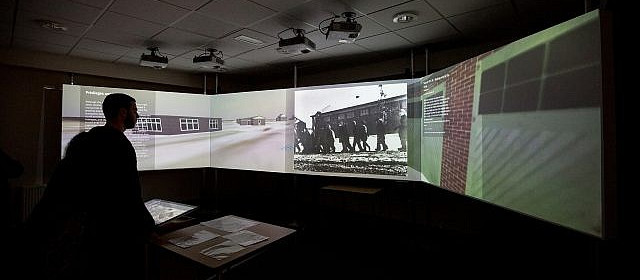From October 2017 to January 2018, a Virtual Reconstruction of Camp Westerbork was on display in the Memorial Centre Camp Westerbork. In one of the museum’s exhibition rooms, the public could wander through the virtual Westerbork of the autumn of 1943 via a tablet and a 180 degree projection on large screens.
The VR attracted a lot of attention. For example, a local TV channel made a report about the VR and thousands of visitors viewed the innovative application that was put together in close collaboration with the Pompeu Fabre University of Barcelona.
At the same time as the opening of the VR, an audience survey in the form of interviews with visitors and monitoring was carried out. This audience survey showed how diverse visitors viewed such an innovative way of telling history, especially from an ethical perspective.
While part of the audience praised the VR for making the story of Camp Westerbork more comprehensible and conveying it in a more appealing way, another part of the audience stated (in advance) that such an initiative would trivialize and tarnish the history of Camp Westerbork and not represent it correctly. “What is the next step?”, one visitor asked in response to the realization of the VR. “A virtual ride on a cattle wagon? You turn an immense tragedy into an experience. A spectacle.”
These critics implicitly referred to the famous statement by sociologist Theodor W. Adorno. Is an vizualisation of a place like Auschwitz-Birkenau (or in this case Westerbork) even possible? And to what extent and form should you actually portray the fraught history of a former Nazi concentration camp like Westerbork?
The Virtual Reconstruction of 2017 will be given a new life within the international collaboration project MEMORISE. We are currently working hard to give the VR a new look, with modern features, a 2023 design and extra historical information. But also with new possibilities to ask the ethical questions of the past again. Because perhaps the history of Camp Westerbork will no longer change, the meaning that the camp has for its visitors will do this, maybe even more so. And with it also the ethical frameworks for how the story may, could and perhaps should be told.
From 21 November 2023, a (first) exhibition will be on display in the Memorial Centre Camp Westerbork where the preliminary results of MEMORISE will be on display. Visitors not only get a better idea of what MEMORISE is and does, but are also asked to think along and reflect on the questions underlying the project.




One response
What aspects of the Memorise exhibition at Kamp Westerbork are highlighted on the website?
Regard Telkom University